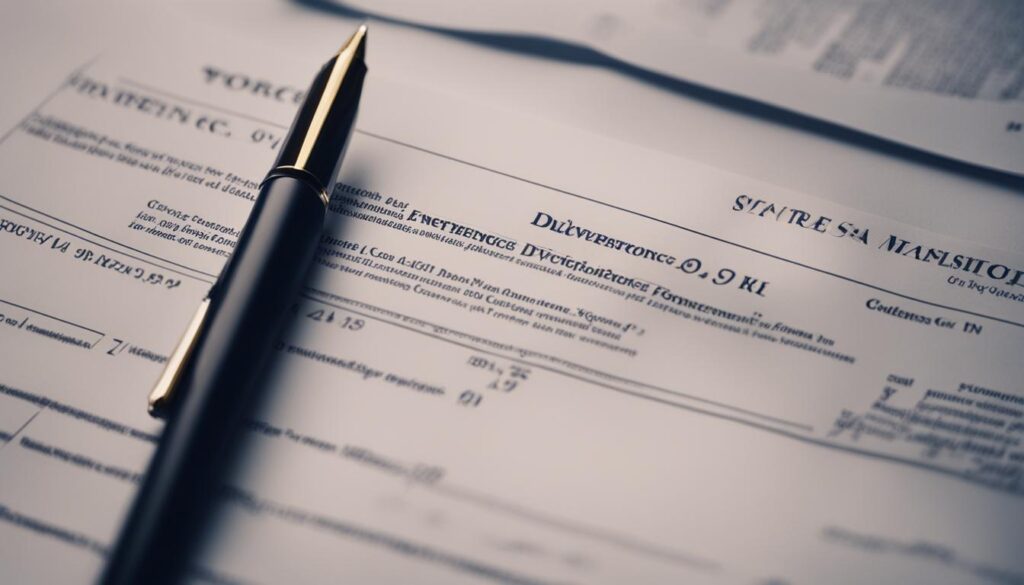Physical Address
304 North Cardinal St.
Dorchester Center, MA 02124
Physical Address
304 North Cardinal St.
Dorchester Center, MA 02124

Facing a divorce in Georgia? It’s a big step, and knowing what’s ahead can make all the difference. Our guide is here to help, breaking down everything you need to know in easy-to-understand steps.
We’ll cover who can get a divorce in Georgia and why, the essentials of preparing for it, and a step-by-step guide to filling out and filing your forms. Plus, we’ll walk you through serving divorce papers and responding to a divorce petition.

Think of this guide as your helpful companion through each stage, making sure you’re ready for this important change in your life. Let’s get started on this journey together.
For more on how to file for divorce, check out our article, How to File for Divorce: A Concise Guide for Couples.
Before initiating the divorce process in Georgia, it is crucial to understand the state’s divorce residency requirements. These requirements dictate whether you or your spouse qualify to file for divorce in Georgia and directly impact the procedure that follows. In this section, we will provide insight into Georgia’s residency requirements, which are a non-negotiable element of the state’s divorce laws.
According to the divorce requirements in Georgia, at least one spouse must have resided in the state for a minimum of six months before filing for divorce. This residency criterion takes precedence over other aspects of the divorce process. If neither spouse meets this requirement, you will be unable to file for divorce in Georgia and should consult the state divorce laws that apply to your residency jurisdiction.
Establishing residency may involve presenting various forms of proof, such as:
Once the Georgia divorce residency requirements are met, you can confidently move forward with the process, which includes filing a divorce petition, serving divorce papers, and ensuring you adhere to other legalities outlined by the state.
It’s crucial to remember, however, that meeting the residency criteria is only the first step in the divorce process. While it enables you to file for divorce in Georgia, ultimately, you’ll need to address and negotiate various divorce-related issues, including property division, child custody, and spousal support. Seeking guidance from a knowledgeable divorce attorney acquainted with Georgia’s family law can make navigating these matters smoother and lead to a more favorable outcome.
In Georgia, it is essential to understand the grounds for divorce before initiating the process. The state permits both no-fault and fault divorces, each with specific eligibility criteria.
In a no-fault divorce, the marriage is deemed irretrievably broken, and neither party is blamed for the breakdown. This is a common option for spouses seeking an amicable and straightforward separation.
On the other hand, fault divorce involves attributing blame to one party for the end of the marriage. Specific grounds for a fault divorce in Georgia include:
Fault divorce cases often require more legal work and evidence to support the allegations. Providing clear justifications for fault divorces is essential for a successful outcome.
In Georgia, eligibility for filing for divorce is conditional, with specific grounds for divorce considered. To be eligible, at least one spouse must have resided in the state for six months or more. In addition, the marriage must be irretrievably broken, or meet one of the previously mentioned fault-based grounds.
Moreover, military divorce in Georgia mandates special conditions. Residency criteria differ in these cases, with the petitioner or respondent either residing or being stationed in Georgia for at least six months. Further, military divorces must adhere to the Servicemembers Civil Relief Act (SCRA) and the Uniformed Services Former Spouses’ Protection Act (USFSPA), which discuss service members’ protection and military retirement benefits, respectively.
To better understand your eligibility and circumstances, consider consulting a divorce attorney specializing in Georgia’s divorce laws.

When you’re preparing for divorce, a crucial step is to organize your finances and documents. Proper financial planning for divorce can help you avoid potential pitfalls or unexpected surprises. Additionally, having all necessary divorce documents organized and readily accessible will significantly streamline the process.
Here’s a comprehensive checklist to ensure that you have everything in order:
Besides financial matters, organizing your divorce documents can largely influence the success of your divorce proceedings. Consider these steps when dealing with legal paperwork:
By organizing your financial matters and necessary documentation, you’ll be better equipped to navigate the complexities of a divorce. Remember, ensure you and your spouse have met the required minimum of six months residency in Georgia before proceeding.
Finding the right Georgia divorce attorney for your case can feel overwhelming, particularly when you are already dealing with such a major life change. It’s vital to choose an attorney who specializes in Georgia family law, including legal separation and various grounds for divorce. To simplify the process, consider these key factors when choosing the best legal representation.
One crucial aspect when selecting a divorce attorney is evaluating their experience and specialization in family law, specifically in Georgia. Ensure they possess an in-depth understanding of Georgia divorce laws, legal separation, and the specific divorce grounds relevant to your situation. You may want to visit the State Bar of Georgia’s website for resources on qualified legal representation.
When evaluating the attorney’s experience, consider the following factors:
Another important aspect is understanding the attorney’s fee structures for divorce attorney consultations and overall legal representation fees. Some attorneys may offer free initial consultations, while others do charge a fee for the first meeting. Also, the attorney’s fees should be transparent and in line with the complexity of the divorce case.
Make sure to inquire about the following:
Selecting the right Georgia divorce attorney to represent you during your legal separation process may seem daunting. However, by diligently evaluating their experience and specialization, and understanding their fees and consultation structure, you can confidently make an informed choice that will best serve your needs throughout the process.

Filing for divorce in Georgia begins with the completion of the necessary divorce paperwork, which varies depending on whether or not there are minor children involved. Knowing where to file for divorce and which documents to prepare can help simplify this process and reduce stress.
To initiate the divorce process, the divorce petition needs to be filed with the Superior Court in the county where either you or your spouse reside. Generally, the following documents are required for divorce filings in Georgia:
You can access the required state forms for divorcing with or without minor children by visiting the official Georgia Court website.
Although the paperwork for filing a divorce in Georgia is fairly straightforward, you may still benefit from obtaining guidance from a divorce attorney. A qualified professional can ensure you prepare and file your divorce documents correctly and offer advice on how to proceed with your specific situation.
Once your divorce paperwork is complete, you’ll need to pay the filing fee required by your specific county. This can vary between counties but generally ranges from $200 to $300. If you cannot afford the filing fee, you can apply for a fee waiver.
After you have submitted your divorce paperwork and paid the required fee, the next step is serving the divorce papers to your spouse. This process is covered in more detail in Section 9 of this guide.
Divorce mediation plays a significant role in resolving issues out of court, particularly in cases of uncontested divorce in Georgia. Mediation offers couples an alternative to litigation, fostering collaboration and negotiation to find mutually agreeable solutions to contentious matters such as child custody, property division, and support arrangements. In this section, we’ll delve into the benefits of divorce mediation and explore some high-conflict divorce strategies that may help you achieve a more favorable outcome.
So, why choose divorce mediation over litigation? The primary advantages of mediation include:
In high-conflict divorce cases, mediation can provide a structured environment in which parties can communicate their grievances and work together to find suitable resolutions. Some successful high-conflict divorce strategies that can be employed during mediation are:
Although mediation is commonly associated with uncontested divorces, it can also be an effective tool in contested cases to minimize damage to relationships and reduce the burden on the family. However, it is essential to remember that mediation may not be right for every divorce, especially in cases involving domestic violence or a significant power imbalance between spouses.
By considering divorce mediation in Georgia as an alternative or supplement to traditional litigation, you may find that resolving your marital disputes becomes a less adversarial and more productive process, ultimately yielding a better outcome for all parties involved.

Filing for divorce in Georgia requires accurate completion and submission of the appropriate divorce forms, ensuring that all requirements are met. Depending on your marriage situation, you may encounter different forms to fill out. This section helps you navigate the divorce forms in Georgia for couples with or without children and provides critical information about state-specific child custody laws. The key to a smooth divorce filing process is understanding the forms you need and the information required by the court.
When filing for divorce in Georgia, you must first identify the correct divorce forms relevant to your situation. It’s essential to use the appropriate forms, as couples with children may have specific requirements in their divorce paperwork.
Visit the Georgia Courts website to download the required documents, which vary depending on your marriage situation:
For cases involving children, Georgia state-specific child custody laws must be followed when filling out the forms. Factors considered by the courts when determining child custody include the parents’ ability to care for the child, the child’s wishes, and the stability of the child’s home environment.
Once you have downloaded and filled out the necessary forms, double-check all the information provided. Accurate and thorough information ensures that your case proceeds smoothly, and wrong or incomplete information could delay your divorce process.
In addition to completing the forms, ensure that you have all the required supplemental documentation such as proof of residency and copies of income statements, assets, debts, and any other relevant financial records.
Upon completing the divorce paperwork, you must submit your forms by filing them with the Clerk of the Superior Court in the appropriate county where you or your spouse reside. A filing fee will be required, and the exact amount can be confirmed at the clerk’s office. As a final reminder, ensure that you have adhered to all state-specific child custody laws and guidelines to avoid any complications during your divorce process.

Once you have filed your divorce petition, the next step in the divorce process is to officially inform your spouse about it. In Georgia, the legal requirements for serving divorce papers ensure proper notification to the other party, allowing them an opportunity to respond. This section provides essential information on the proper way of serving divorce papers in Georgia.
Georgia divorce law mandates that the respondent spouse must be personally notified of the divorce papers. There are several ways to serve divorce papers in Georgia, the main methods include:
Remember, each method of service comes with specific requirements and consequences, so it’s important to consult an attorney to better understand the most suitable option for your case.
In Georgia, serving divorce papers is a crucial aspect of the divorce process and must be done according to legal requirements to avoid potential complications. Timely and proper service ensures smooth progress through the divorce proceedings and minimizes potential disputes over notification.

Once you have been served with a divorce petition in Georgia, it is crucial to respond within the given time frame to protect your legal rights and interests. Failing to do so can lead to what is known as a default divorce, in which the court may grant all the requests of the petitioning spouse without further input from the respondent.
Typically, the respondent spouse has 30 days to reply to the divorce petition. This period extends to 60 days if they are residing outside Georgia but within the U.S. During this time, the following steps need to be taken:
It is important to note that divorce filing fees may apply when submitting your response to the court. These fees can vary by county, so it is advised to inquire with the local Superior Court’s office or website to determine the correct fees.
In the event that you fail to respond to the divorce petition within the given time frame, the court may proceed with a default divorce based on the petitioning spouse’s requests. This can result in a divorce settlement that does not reflect your preferences or best interests. Therefore, it is crucial to respond promptly and diligently to secure a fair outcome.
Filing for divorce in Georgia can be a complex and emotional process, especially for those unfamiliar with state-specific divorce procedures. By understanding your eligibility, grounds for divorce, and requirements for organizing documents, you will be better equipped to navigate the divorce process and make informed decisions. It is important to be familiar with post-divorce legal changes and seek appropriate emotional support for divorce as these changes can affect both your personal life and legal status.
As you go through the process, consider key aspects such as preparing the forms, deciding where to file, filling out the forms, and serving the divorce papers to your spouse. Familiarize yourself with divorce FAQs and useful state family law resources to ensure your filing process goes smoothly. If necessary, consult with a Georgia divorce attorney specializing in family law to further understand how to get a divorce in the state and ensure your best interests are represented.
In conclusion, taking the time to educate yourself on Georgia’s divorce laws and procedures can help alleviate stress and provide a sense of clarity during this difficult time. By following this comprehensive guide, you can confidently and efficiently tackle the important steps involved in filing for divorce in Georgia.
To see how this process of filing for divorce in Georgia compares to that in other states, check out our articles about how to file for divorce in Florida and filing for divorce in South Carolina.
To file for divorce in Georgia, either spouse must have resided in the state for at least six months prior to filing. Also, the petition should be filed in the Superior Court of the appropriate county where either spouse has lived for at least six months.
Georgia allows both no-fault and fault divorces. In a no-fault divorce, the marriage is considered irretrievably broken without blame attributed. Fault divorce requires proving specific grounds such as adultery, mental incapacity, cruelty, or habitual substance abuse among others.
It’s essential to select a divorce attorney who specializes in Georgia divorce laws including legal separation and specific divorce grounds. Visiting the State Bar of Georgia’s website is recommended for resources on qualified legal representation.
Divorce petitions are filed at the Superior Court in the spouse’s county of residence. The online Georgia Court website provides forms for divorcing with or without minor children. Guidance from a divorce attorney can ensure the correct filing procedures are followed.
Divorce mediation plays a significant role in resolving issues out of court, especially in uncontested divorces. It’s a recommended approach for resolving custody and property disputes in a less adversarial manner, potentially leading to better outcomes.
Completing divorce paperwork accurately for couples with or without children requires navigating through forms available on the Georgia Court’s website and adhering to state-specific child custody laws and guidelines. Detailed filings address major issues without an exhaustive list.
Georgia divorce law mandates personal notification of divorce papers to the respondent spouse either by a sheriff or a process server. An alternative is for the spouse to sign an Acknowledgement of Service if they agree to cooperate or service by publication if they cannot be located.
The respondent spouse has 30 days to reply to the divorce petition (or 60 days if they’re outside Georgia but within the U.S.). A failure to respond could result in the court proceeding with a default divorce based on the petitioning spouse’s requests.
Post-divorce legal changes may include child custody arrangements, child support guidelines, alimony laws, and property division in divorce. Emotional support resources for divorce, divorce FAQs, and state family law resources are also available to help navigate the divorce process in Georgia.